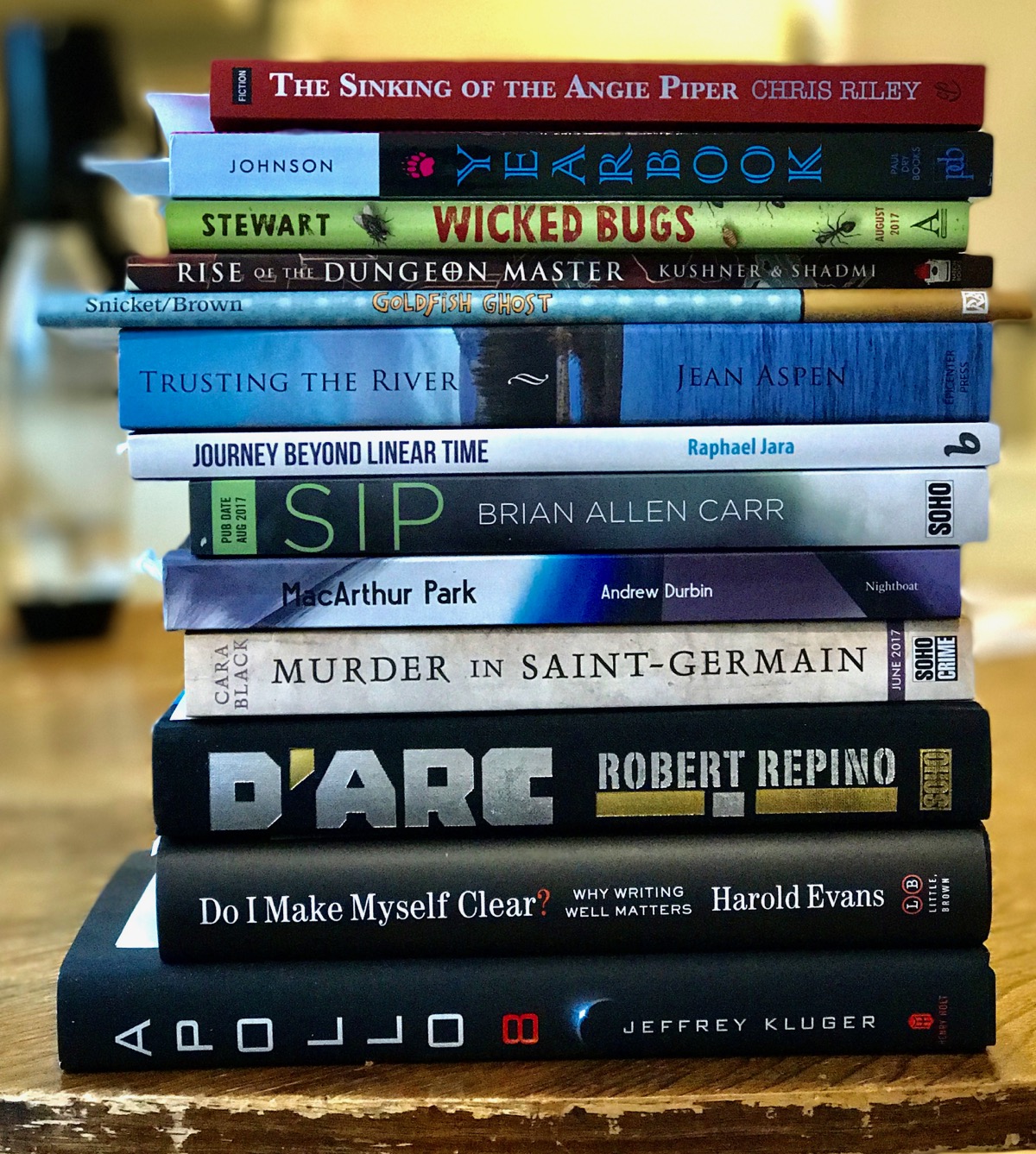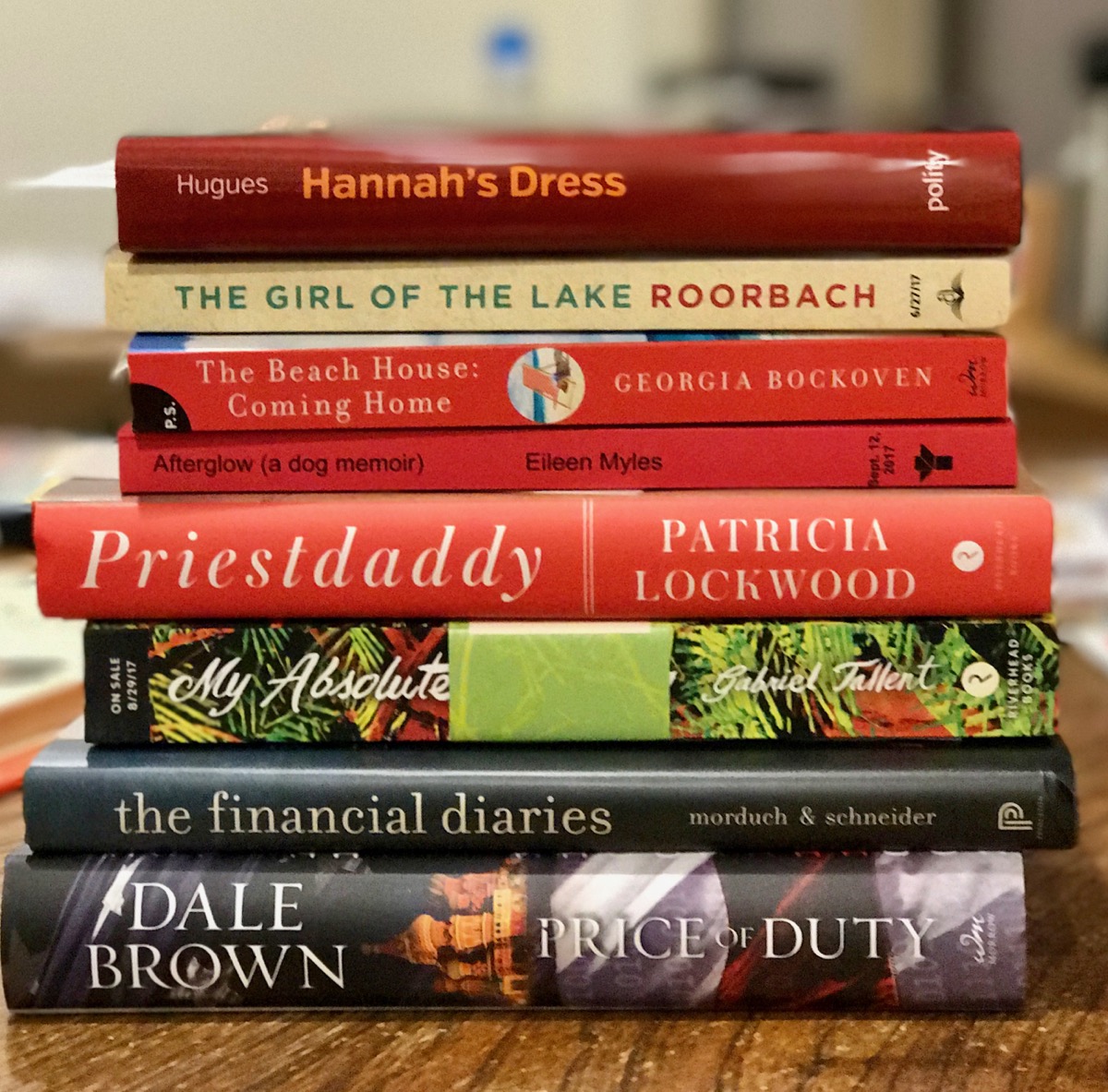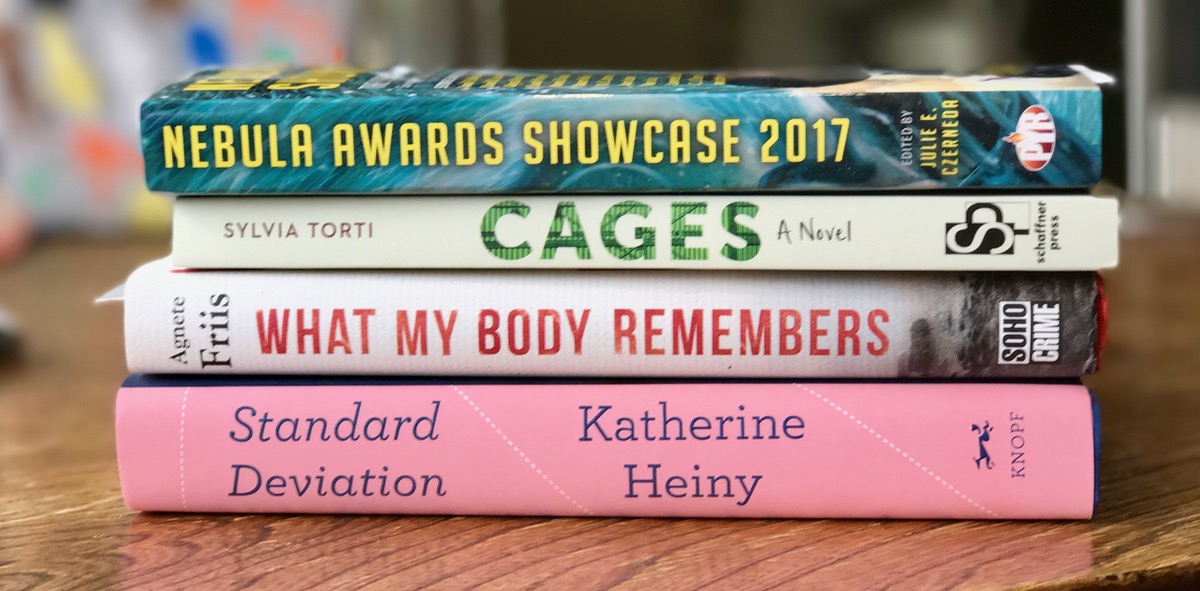Literary Event of the Week: Seattle Reads The Turner House
Every year, the Seattle Public Library chooses one book to headline its “Seattle Reads” program. The idea is to get as many copies of a single title into as many hands as possible, to bring the author to as many of Seattle’s neighborhoods as they can in a single week, and to examine a book thoroughly. It’s a noble idea and it raises some interesting questions about place and readership: does Ballard, say, read a book differently than Rainier Valley? How does a city read?
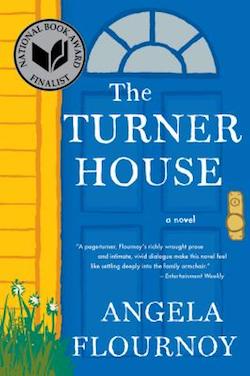
This year’s Seattle Reads selection seems to be selected to put that question to the test. Angela Flournoy’s debut novel The Turner House was published two years ago, but it addresses issues that this city is wrestling with right now. Set in Detroit during the financial collapse of 2008, The Turner House is about the adult children of a large family — 13 children, though we only really spend time with a handful of them — who must decide what to do with the family home, which is worth so little that burning it down would probably be a profitable decision.
People who complain that literary fiction is out of touch with the concerns of the working class are sleeping on this book. We follow the Turners through the 20th century. As black Americans, they have to fight to enjoy the same American dream enjoyed by the white working class: the police are always watching them, hoping for a misstep; they work harder to earn the same jobs and financial benefits that a white family of the same income bracket would come to expect. When the financial crisis arrives and wipes out that American dream for everyone in the 99 percent, the Turners are a little less surprised than white families, but they’re still hurting.
Like any good novel that is firmly rooted in a specific place and time, The Turner House develops a certain universality. The Seattle of 2017 will very likely see itself in the Detroit of this book. We, too, are seeing the working class being pushed out of a city. We’re witnessing the results of systemic racism in policing and education and economics. We’re living with a mental health system that ignores those most in need. The story that Flournoy tells with this family — a haunted house story, really, of a different kind — is exactly the story we need to read right now, because it’s exactly the story we’re living right now.
Flournoy is in town from May 8th to 11th to read from The Turner House and to talk with Seattle communities about the book. On the evening of the 8th, she’s reading at the Columbia branch of the library. On the 9th, she’s at the University District branch and the Ballard branch; the 10th brings her to the Southwest branch and the Langston Hughes Performing Institute; and on the 11th she reads at the Central Library downtown. All events are free; all are welcome. Find all the details at http://www.spl.org/audiences/adults/seattle-reads
A preview of the Seattle International Film Festival's most bookish offerings
This morning, tickets to the 2017 edition of the Seattle International Film Festival go on sale for SIFF members. This year's SIFF is huge (400 films from 80 countries) and diverse. Highlights include a series spotlighting films from nations on President Trump's travel ban list, an education series for kids, and a heavy focus on Northwest filmmakers, women directors, and films that as of yet have no established North American premiere dates.
Tickets for the general public go on sale starting tomorrow. (If you're not a SIFF member, I recommend it; you get discounted tickets and free popcorn and early access to events like, well, festival screenings.) I attended the SIFF press launch last night and I have some tips on bookish movies that readers of the Seattle Review of Books might want to keep in mind. Here's an overview of some of the literary and literary-adjacent SIFF films:
The Young Karl Marx is the closing-night film of the festival, screening on Sunday, June 11, at Cinerama. It's a biopic from Raoul Peck (director of the excellent I Am Not Your Negro) about the birth of the friendship between Friedrich Engels and a passionate young writer named Karl Marx.
The closing seconds of the trailer for the raunchy Middle Ages nun comedy The Little Hours claims that it's "Based on The Decameron by Boccacio." That's maybe a stretch, but with a cast like this — Alison Brie, Aubrey Plaza, John C. Reilly, Nick Offerman — I'm willing to give it some room for literary license.
Based on the Stephen Fry novel of the same name, The Hippopotamus is about an alcoholic writer who travels to the countryside in order to debunk a reported series of miracles.
It's a big year for fairy tales at SIFF. The French films The Girl Without Hands and Ivan Tsarevitch and the Changing Princess: Four Enchanting Tales adapt fairy tales into animated movies. The Girl Without Hands is a Brothers Grimm deep cut. Revolting Rhymes collects five of Roald Dahl's poetic fairy-tale updates into cute animated shorts.
Lady Macbeth isn't based on Shakespeare; rather, it's adapted from a Russian novella from 1865 by Nikolai Leskov titled Lady Macbeth of the Mtsensk District. (The novella has also been adapted into an opera by Dmitri Shostakovich.) I've been waiting for this one to land for a while; seems like I first saw the trailer months ago.
Some other quick hits:
Based on a memoir titled The Hypocrisy of Disco, the film Lane 1974 is a coming-of-age film about a 13-year-old girl with a decidedly unreliable mother.
Austin-based junk-rock orchestra The Invincible Czars will be performing their score for the 1920 silent-film version of Dr. Jekyll and Mr. Hyde live at The Triple Door on Thursday, June 6.
The Truth About Love Is ..., which is making its North American debut at SIFF, is based on a popular Italian memoir by a divorced housewife.
The Captain Underpants movie will make its Seattle debut at SIFF, if your kids are into that kind of thing.
The festival also features a tribute to Anjelica Huston that features two of her best adaptations — Jim Thompson's creepy con-artist noir The Grifters and Roald Dahl's The Witches.
We'll be running reviews and news from the literary side of SIFF in the days and weeks ahead. For now, go get your tickets.
This is just a reminder that Mount Analogue publishes an amazing political pamphlet series, and they are right now open for submissions.
This call seeks pamphlets that use either/or text and image, that range from personal reactions and experiences with oppression / to political research and essays / to lists of ways to practice radical self-care / to more.
This call is open to the LGBTQ community, to womxn, to minorities, to immigrants, and to those with disabilities only. Collaborative pamphlets are welcome and encouraged.
In keeping with political pamphlets as a form, we are seeking no fewer than 5 and no more than 15 pages of content.
If you have something you want to share with the world, they're waiting for you
Stand up poetry
Published May 02, 2017, at 12:27pm
Cody Walker and Jason Whitmarsh demonstrate two very different approaches to funny poems.
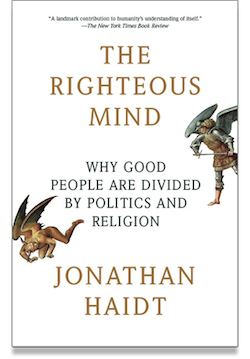
Tomorrow night at Third Place Books Seward Park at 7 pm, I hope you'll join Seattle Weekly editor-in-chief Mark Baumgarten and myself and my Seattle Review of Books cofounder Martin McClellan in a discussion of Jonathan Haidt's amazing book The Righteous Mind: Why Good People Are Divided by Politics and Religion.
The May installment of our Reading Through It book club is more theoretical and less interested in current events. It's more than just a way to understand the conservative perspective — it's about the many ways that we all seek to organize the world to suit our individual worldview. This could be the most important book we've discussed yet, and it's sure to be a fantastic conversation. I hope you'll join us.
Diaspora Sonnet I
I walk the narrow pedestrian passage
illumined so its girdered ribs show
like names on a ledger. Every step
sudden and trochaic — the beginning
of facts. Of being here.I look up and see the moon
is brandishing its ghosts. What is
here and not here. What is
a face in the sky. What breaks
the shape of the known and obvious.If I could say it, I would say
"I was broken and I took him in."
I would ask, "Do you trust me?"
I would point to the landscape.
Back when he was just a presidential candidate, I wrote about Donald Trump's love of the poem "The Snake.". Over the weekend, President Trump read the poem again. As Chris Cillizza points out, the poem has a very different meaning, now that Trump is Commander-in-Chief.
Caught in the Lights
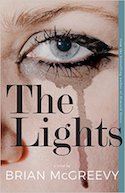
Sponsor Brian McKreevy's new novel The Lights is being released next week. It's a philosophical inquiry into the nature of how we connect in our most intimate bonds — and, bonus, it starts when gifted writer Leda Galvan moves to Austin to join an MFA program. It's an examination of love and art, all set in Texas among aspirational writers.
That's something McKreevy knows all about — he was a James Michener Fellow in fiction and screenwriting at the University of Texas. He's also the author of Hemlock Grove, a gothic novel produced by Netflix into a series. He's "alarmingly talented", and one reviewer said "The Lights is a funny and honest look at how we negotiate our own morality on a sliding scale." Read more on our sponsors page — and get ready for The Lights, coming out next week.
Sponsors like Brian McKreevy make the Seattle Review of Books possible. Did you know you could sponsor us, as well? Get your stories, or novel, or event in front of our passionate audience. We have a few dates in June and July ready for you to grab. Take a glance at our sponsorship information page for dates and details.
Our Independent Bookstore Day, in photos
Just a reminder that if you follow the Seattle Review of Books on Instagram, you'll find all sorts of photos of readings, events, and Little Free Libraries that you might not see here on the site. We'll be out and about on Free Comic Book Day this Saturday, too; be sure and follow us to keep up on the action.
How to celebrate Free Comic Book Day and promote literacy at the same time
This Saturday, every comic book store in the greater Seattle Area will celebrate Free Comic Book Day, an industry-specific holiday. FCBD is exactly what it sounds like: stores give away free comics — traditionally samplers of new and upcoming series that publishers would like to promote to new readers — to anyone who visits.
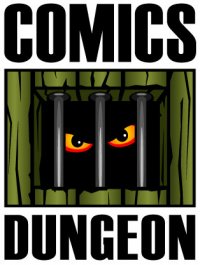
For many years, the Wallingford shop Comics Dungeon has put on Seattle’s greatest Free Comic Book Day show, with guest creator appearances, signings, and cosplayers dressed like superheroes or pop culture characters. One year, an entire team of Storm Troopers from Star Wars stood outside the store and waved people inside. Traffic in front of the store on NE 45th slowed down due to excessive rubbernecking.
Earlier this year, Comics Dungeon owner Scott Tomlin made a big announcement: he was taking his store nonprofit. Tomlin announced that he was founding a new comics-centric education program called Comics for Community, Compassion and Culture — C4C3 for short. We talked with Tomlin about his new roles as president of C4C3 and executive officer at Comics Dungeon, what C4C3 is all about, and what to expect for Free Comic Book Day this year.
Could you talk about the nonprofit, which I understand is fairly new?
Yeah it is. We actually launched the nonprofit in March at Emerald City Comic Con — we technically had applied a couple weeks before, but we launched then.
Our whole mission is about getting comic books into schools, libraries and classrooms. Over the years, we've done programs with schools and teachers and librarians, but we’ve been seeing this really big interest in the comics lately. One, because of the pop culture aspect — it's become more mainstream nowadays.
The medium of comics changes people's approach to education and reading, and we've found that the schools and libraries are actually surprisingly underfunded in some of these arenas. I just found out at least one of the middle schools in Edmonds, for example, has a zero dollar budget for their school library. We're finding that to be a little more common than not, unfortunately. When they do get money, they tend to focus on the staples and don't want to necessarily expand.
So that's what we're trying to do. Just last week, we opened up our grant period — our first one of the organization — where we're offering to librarians and teachers the opportunity to apply for grants of up to $300 to get comic books into the school library.
And what is the relationship between Comics Dungeon and Comics for Community, Compassion, and Culture?
The Comics Dungeon has actually been around for 26 years in Seattle. I owned it for 11 years. We just converted that organization into the nonprofit.
One kind of parallel, if it helps, is to think of us as the gift store at a museum. The museum's a nonprofit organization; they happen to have a retail arm. But all the profits we make out of this store go to funding our cause, and obviously paying salary of the staff. The store's our primary fundraising source but it's not our only one. We take donations and all of that as well.
Do you have any programs together yet? What does your outreach look like?
Our programs are going to be demand-driven initially. We have one in store; we're doing a kids art program. Basically, it's a drawing club. Kids who like to draw come together and hang out with other kids who like to draw. We have book clubs in the store as well, and we're going to be reaching to the schools and see what we can do about coming in and helping them out.
One of the things we're doing in this grant process is asking these educators what are they interested in having: Is it in-class presentations? Is it professional development presentations?
Has anything surprised you so far, in terms of the need and what people are interested in?
Yeah. When we launched at Emerald City, we were a little tentative. We weren't sure how people were going to react, basically, but we got an overwhelmingly positive reception. We met a lot of educators at the convention that were just doing backflips on the whole concept. People were asking, "can I volunteer for you tomorrow?" Things like that. That was really exciting.
What we found, too, is that we haven't yet found a teacher that wasn't interested. Whether you're a science teacher, a history teacher, an English teacher, or an art teacher, there's value for you in comic books. (We're still struggling with the math teachers, but we want to get there too.)
It's just really surprising how positive the reception has been and how generous people have been. We've received probably 10 longboxes as donations in our first month and a half, as well as a few hundred dollars’ worth of cash donations as well. It's been rewarding to see the value of what we're doing catching on so quickly.
That leads into my next question, which is what can people do to help?
Obviously, donations. It’s a great way to donate comic collections. A lot of comic collections aren't worth what people want them to be, and this allows them to have a better tax situation potentially at the end of the year.
And we obviously love cash donations, but the easiest thing to do is, if you buy comic books, just come shop here because it benefits our organization automatically. We're also going to be starting some volunteer programs to help us around the store.
We’re at http://www.C4C3.org, and our email is info@c4c3.org. if you have any ideas or any interests we can be reached there and happy to discuss and figure something out.
With Free Comic Book Day, you guys have always had the biggest show in town. Do you have any plans for this year?
Yeah. This year, almost all day we’ll have at least one creator on hand. These are local creators that are producing well-known books. Obviously, we'll have the free comic books, and a sale to go along with that.
We always have our “Day After Free Comic Book Day Sale” as well. That focuses on back issues, and back issues are one of our best ways to raise money for the nonprofit, because that's typically where we have our best margins.
We might have some cosplayers this year, but we'll see. They're like herding cats, sometimes.
The Sunday Post for April 30, 2017
Each week, the Sunday Post highlights a few articles good for slow consumption over a cup of coffee (or tea, if that's your pleasure). Settle in for a while; we saved you a seat. You can also look through the archives.
Viet Thanh Nguyen Reveals How Writers’ Workshops Can Be Hostile
This is a scathing take on that most beloved institution of the MFA — the writing workshop — by Viet Thanh Nguyen, Pulitzer Prize-winning author of The Sympathizer. Hard to say what’s most terrifying here: the thought that this set of attitudes and assumptions is readily accepted (and celebrated) throughout American literary culture … or that it’s becoming an infectious export globally. I’m going to shut up now and let Nguyen carry it:
We, the barbarians at the gate, the descendants of Caliban, the ones who have no choice but to speak in the language we have — we come bearing the experiences and ideas the workshop suppresses. We come from the Communist countries America bombed during the Cold War, or where it sponsored counter-Communist efforts. We come from the lands America occupied, invaded or colonized. We come as refugees and immigrants, documented and undocumented. We come from the ghettos, barrios, reservations and borders of America where there are no workshops. We come from the bedrooms and the kitchens of the American home, where we were supposed to stay, and stay silent. We come speaking languages other than English. We come from the margins, where English is broken. We come with financial aid and loans and families that do not understand what “creative writing” is. We come from communities we do not wish to renounce in the name of our individualism. We come wanting to do more than just sell our stories to white audiences.
Torching the Modern-Day Library of Alexandria
Making every book in the universe searchable and instantly available online? Yes, please. Stealing income from authors and holding libraries hostage to skyrocketing access fees? No, thanks. That, in a nutshell, is the story of Google’s “Project Ocean,” a moonshot to scan every book on the planet.
James Somers threads the massive legal labyrinth of copyright and class action suits that’s holding the world’s largest digital library hostage — and demonstrates just how urgently we need a new model that mediates between artists and audiences in a sane and sensible way.
Somewhere at Google there is a database containing 25-million books and nobody is allowed to read them. It’s like that scene at the end of the first Indiana Jones movie where they put the Ark of the Covenant back on a shelf somewhere, lost in the chaos of a vast warehouse. It’s there. The books are there. People have been trying to build a library like this for ages — to do so, they’ve said, would be to erect one of the great humanitarian artifacts of all time — and here we’ve done the work to make it real and we were about to give it to the world and now, instead, it’s 50 or 60 petabytes on disk, and the only people who can see it are half a dozen engineers on the project who happen to have access because they’re the ones responsible for locking it up.
How eBooks lost their shine: 'Kindles now look clunky and unhip'
eBooks can be polarizing: friends and families set at odds, lovers torn apart over paper vs. Paperwhite. In a bit of good news for those holding up the side for physical books, headlines that once read “print is dead” are suddenly posting obits for electronic editions. Paula Cocozza argues that digital books are simply finding their level, but that won’t stop us from enjoying the public re-investment in the beauty of a well-made book.
Once upon a time, people bought books because they liked reading. Now they buy books because they like books. “All these people are really thinking about how the books are — not just what’s in them, but what they’re like as objects,” says Jennifer Cownie, who runs the beautiful Bookifer website and the Cownifer Instagram, which match books to decorative papers, and who bought a Kindle but hated it. Summerhayes thinks that “people have books in their house as pieces of art”. One of her authors’ forthcoming works features cover art by someone who designs album covers for Elbow. “Everyone wants sexy-looking books,” she says.
Dan Rather’s Second Coming
It’s deeply satisfying, from a narrative perspective, that the Trump presidency has invigorated both the transformation of Teen Vogue and a comeback by discredited elder statesman Dan Rather. Sort of like Don Quixote saddling up to ride with Furiosa … or not, if you’re not that kind of nerd. Ahem. Regardless: In this profile of Rather, Ben Baker describes a journalist who is passionate, articulate, and determined to win the last battle of his career.
For decades, Rather was fodder for critics who considered him too emotional, too liberal, too ambitious, too self-serious. He didn’t smile a lot; his folksy sayings could come off as downright weird. But the exact eccentricities that made at times for an awkward fit for network television, and his talent for thoughtful but unambiguous pronouncements of outrage, have been pitch-perfect for this new medium and moment. One of the leading voices of the Trump resistance is not some black-masked radical or a marching young woman with a pink knit hat but a man with gray hair, a name you know and a neatly knotted tie.
Good Luck, Morons
In a complete change of pace (no pun intended), here’s an engrossing article by Sara Estes about a batshit crazy footrace called the Barkley Marathons that may or may not be run by a man named Lazarus Lake.
Since 1986, the Barkley has been operating entirely under the radar, rising from a casual underground affair to a cult obsession. Few even figure out how to enter the Barkley, fewer still come close to finishing it. Today, people come from all over the world for the chance to annihilate their minds and bodies in a 60-hour, 100-mile, sleepless, nearly impossible gauntlet through the merciless mountains. Lost and alone, they struggle through hallucinations, extreme cold, heat, thunderstorms, sleet, and rock-bottom exhaustion while they navigate vast stretches of sinister, unmarked woodland with only a compass and their prayers.
Seattle Writing Prompts: The Montlake Spite House
Seattle Writing Prompts are intended to spark ideas for your writing, based on locations and stories of Seattle. Write something inspired by a prompt? Send it to us! We're looking to publish writing sparked by prompts.
Also, how are we doing? Are writing prompts useful to you? Could we be doing better? Reach out if you have ideas or feedback. We'd love to hear.

The story I heard was that Seattle enlarged Montlake Avenue and took half of one man's plot by eminent domain. He asked his neighbor, who had a large lot, to split off a bit and sell him some so that he might build a full-sized house. The neighbor refused, so the man built a small house that completely blocked his neighbor's view of Montlake Avenue.
This story makes no sense at all: I mean, who wants a view of a big avenue? I'd thank my neighbor if they blocked the noise and bustle like that. But no doubt, if you know about the spite house, you've heard some story of how it came about: a divorce, feuding neighbors, angry developers. Whatever the case, the base facts about the house are known: it was built in 1925, the house is about 826 square feet. It goes for about the price of a condo these days: it sold in July of 2016 for about $500k.
I toured the house, once. It was on the market in 1989, and I called the realtor to arrange a viewing. I showed up with my girlfriend at the time, and let's just say that neither of us really looked much like potential homeowners. His skeptical scowl told me that he was onto the ruse, but such is the price of hosting an infamous house. And, really, maybe I should have bought it: I remember the listing price as $60k or so, which seemed outrageous to me at the time, but given that my rent was $450 for an 800-square-foot studio on Capitol Hill, I probably could have afforded the mortgage if I had figured out how to work a down payment.
Every time the house hits the market, news sites around the world list it as a novelty. Google searches for 'Montlake Spite House' raise a lot of links. Take the real estate photos, write up a lazy summary for your readers, and there you go: you've garnished clicks for your site. But all of them claim one thing: nobody knows the real story of how that house came to be or what it's about. And while that may be frustrating from a historical truth point of view, it's awfully intriguing from the point of view of someone who likes making up stories.
So, maybe we should try to create some?
Today's prompts
The Divorce — Being an independent woman was all the rage, but even if you were a flapper, being a divorced woman in the 1920s was no laughing matter. Even worse was when your ex-husband was ordered to divide the land by a judge, but not told in what proportion. Nothing left to do but show him you can't get rid of an independent woman that easily.
The daughter-in-law — It took her a month of travel after a year of arranging. She came by train, getting stuck crossing the Rockies, which were having a very cold Spring. All just to get to her son on the West Coast, where he settled in Seattle. He'd asked her to come, after all. But when she arrived, he didn't even pick her up at the station, claiming he was busy. When she finally found her way to him, he offered to put her up in an apartment over on Queen Anne, all the way across town from where he lived. When she met her daughter-in-law, she saw where all this guff was coming from. And she knew just the antitode. She bought that tiny piece of land out front of their place. She'd make sure that woman always had a good motherly influence nearby.
The bet — Beggars can't be choosers, but gamblers did choose their lot and so shouldn't beg when they're down. They sure as hell shouldn't welch and make their debtor force them to sell off a piece of their land just to pay down on the debt. If they whine enough, that debtor might just make sure they could stay nearby, just to see that everything that was owed was paid up in full.
The creep — Mrs. Franklin wasn't even yet thirty-five when she was widowed. And with two children to raise, the only thing to do was to shave off a bit of her land and sell it to the city for the extra money. Perhaps, she thought, it could become a small park. Wouldn't that be lovely for the children? It was with great surprise that she noticed a foundation being dug one day, and upon further inquiry, was further surprised to find out the gentleman who bought the land was not connected to the city. He was, unfortunately, a man long familiar to her; one who courted her before she met her husband. One who she rejected many times. One who now leaned on his shovel, taking a break from prying loose some rocks on the land, and gave her a wide smile. "Not gonna be so easy to get rid of me this time," he said with a wink, and then he got back to digging.
The optimist — Someday, he thought, canals would run down the streets in Seattle like in Venice. The Montlake Cut would be dug north and south, and the avenues that lined the college and went up to the hills would be water all the way. So when wicked old Mr. Rockson, who openly mocked the canal vision at a city planning meeting, offered to sell the land that bordered Montlake Avenue to him, little did the old jerk know that he was selling off his canal-front property. And soon that little tiny house out front was gonna be worth four times the house that sat right behind it.
Lunch Date: Taking Exit West to one of the Northwest's famous sandwich joints
(Once in a while, I take a new book with me to lunch and give it a half an hour or so to grab my attention. Lunch Date is my judgment on that speed-dating experience.)
Who’s your date today? Exit West, a novel by Mohsin Hamid.
Where’d you go? I was in Tacoma for a day trip and stopped by the MSM Deli, a legendary lunch spot that doesn't offer much by way of ambiance — it's a convenience store with some card tables — but enjoys a large Northwest fanbase.
What’d you eat? I ordered the Italian coldcut sub. I didn't know how huge the portions were, so I ordered a large, which turned out to be, uh, large.
How was the food? It was good! the meat was great, and they didn't overwhelm with the oil and vinegar, which is nice. It's definitely an east coast sub, and all you transplants who miss the no-frills east coast sandwich should hit up the MSM. I was a little underwhelmed by the bread, though, which was airy and not the most flavorful. The thing with east coast subs is that you're not looking for fancy dense bread. You want something chewy and a little bit plainer than you'd find at, say, Macrina. But they use a very large French bread loaf at MSM, and it was frankly a little too much bread in the sandwich. I thought the ratios were a little overwhelmed by having too much of a not-great bread in the mix.
What does your date say about itself? From the publisher’s promotional copy:
In a country teetering on the brink of civil war, two young people meet—sensual, fiercely independent Nadia and gentle, restrained Saeed. They embark on a furtive love affair, and are soon cloistered in a premature intimacy by the unrest roiling their city. When it explodes, turning familiar streets into a patchwork of checkpoints and bomb blasts, they begin to hear whispers about doors—doors that can whisk people far away, if perilously and for a price. As the violence escalates, Nadia and Saeed decide that they no longer have a choice...
Is there a representative quote? Let's go with the opening paragraph: "In a city swollen by refugees but still mostly at peace, or at least not yet openly at war, a young man met a young woman in a classroom and did not speak to her. For many days. His name was Saeed and her name was Nadia and he had a beard, not a full beard, more a studiously maintained stubble, and she was always clad from the tips of her toes to the bottom of her jugular notch in a flowing black robe. Back then people continued to enjoy the luxury of wearing more or less what they wanted to wear, clothing and hair wise, within certain bounds of course, and so these choices meant something."
Will you two end up in bed together? Yeah! Hamid read at Elliott Bay a few weeks ago and I'm upset that I didn't go to the reading now. This is a totally charming beginning of a book. It reads kind of like a fairy tale — although there are some dark elements stirring in even these first few pages — and there's obviously a bit of a Kundera vibe going on, too. I've not been having the easiest time with novels lately, but Exit West seems like it might break the curse.
Two more events to keep in mind: Trivia for a Cause and Raising Lily Ledbetter

Sometimes we hear about events too late to get them in the readings calendar for the week, but we still think they're worthy events that you should know about. Here are two:
- Tomorrow from 3 to 6 pm, it's Trivia for a Cause at Green Bean Coffeehouse in Greenwood. This event is a fundraiser for the Eastside Mosque, which was damaged in an arson fire back in January. There will be readings from Seattle poet Samar Abulhassan, eight rounds of trivia, and a set from comedian Wilfred Padua. Admission is $20. If you can't attend because you're busy doing Independent Bookstore Day, you can donate directly to the mosque here.
- On Tuesday May 2nd, Town Hall Seattle is hosting a reading for the poetry anthology Raising Lilly Ledbetter, which celebrates women at work. I reviewed this anthology back when it was first released in 2015, but now that we have a Grabber-in-Chief who surrounds himself in the workplace with aggrieved white men, it's even more relevant. If you're looking for a bit of empowerment through art, this is the reading for you.
The Help Desk: When it comes to autographs, this author is all thumbs
Every Friday, Cienna Madrid offers solutions to life’s most vexing literary problems. Do you need a book recommendation to send your worst cousin on her birthday? Is it okay to read erotica on public transit? Cienna can help. Send your questions to advice@seattlereviewofbooks.com.
Dear Cienna,
I’ve published a couple of sci-fi novels — probably nothing you’ve heard of. But every once in a while I’ll do a reading, and then comes the time to sign the books. This always stresses me the fuck out.
Cienna, my handwriting is awful, and my signature is ugly. Every time I sign a copy of my book, I feel like I’m defacing it. I’d probably feel more comfortable if someone handed me my book and asked me to burn it.
I’ve tried to practice my autograph, but that makes me feel like a pretentious jerk and my handwriting just goes back to unreadable anyway. Is there anything I can do about this?
Bob, South Park
Dear Bob,
Perhaps a corpse hand would boost your confidence? Unlike its cruder cousins – the lobster hand and hook for hand – a repurposed corpse hand would complement the mystique of your chosen genre. A writer friend of mine has corpse heels in place of his original ones – they are the consolation prize he won for jumping out of an apartment window onto a school bus because someone dared him to. As far as I can tell, they don't work any better or worse than his original heels but they are now his most popular feature (the parts of him that are alive are swell, too).
I doubt you or your fans would care much about your penmanship if they were given the opportunity to gladhand your corpse hand while earnestly telling you about the subtle inconsistencies they've detected in the worlds you've created. Even just replacing your thumbs for big toes would be a real treat.
So here you go: I dare you to get handsy with a live blender.
If light body modification is beyond the limits of what you're willing to do for your craft, I pity you, but I understand not everyone has what it takes to be successful. If it helps, authors like Kurt Vonnegut and David Sedaris often signed their works with doodles and compliments to their readers instead of signatures, and they seem successful enough.
You could also just bring a pad of ink with you and stamp fans' books with a thumbprint, nullifying the need to write anything at all. That would be novel. It would be more novel if that thumb were also your big toe, but I won't be pushy about it. Your body, your choice.
Kisses,
Cienna
Portrait Gallery: Elisa Chavez
Each week, Christine Marie Larsen creates a new portrait of an author for us. Have any favorites you’d love to see immortalized? Let us know

Sunday April 30th: 2017 Grand Slam
Did you know that Seattle is home to a lively open mic scene? It’s true. The viral poet behind “Revenge,” Elisa Chavez, is just one of the incredible talents to burst out of this scene in recent years. Tonight, the greatest readers at Seattle Poetry Slam compete for the right to represent Seattle at the 2017 National Poetry Slam in Denver.
Town Hall Seattle, 1119 8th Ave., 652-4255, townhallseattle.org. $15. All ages. 7:30 p.m.
Criminal Fiction: blood in the cut
Every month, Daneet Steffens uncovers the latest goings on in mystery, suspense, and crime fiction. See previous columns on the Criminal Fiction archive page
The 2017 Theakston Old Peculier Crime Novel of the Year longlist offers a cornucopia of marvelous mysteries and terrific thrillers, all published in paperback in the UK and Ireland between May 1, 2016 and April 30, 2017. This list includes multiple crime-fiction gems, including Alex Marwood’s seriously dark Darkest Secret, Mick Herron’s canny spyfest Real Tigers, Christopher Brookmyre’s fiendishly clever Black Widow, and Stuart Neville’s suspenseful and heartbreaking Those We Left Behind. Plus, it’s always a pleasure to find industry giants (Val McDermid, Ian Rankin, Mark Billingham) rubbing writerly shoulders with relative newbies such as Sabine Durrant, Sarah Hilary, Susie Steiner, and Eva Dolan. Get reading! The shortlist is out on May 20.
Reading around: new titles on the crime fiction scene
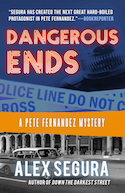
Pete Fernandez is off the sauce and making an okay living as a low-profile PI in Miami, but trouble finds him once again in Dangerous Ends by Alex Segura (Polis). His irregular work-partner-in-crime, Kathy Bentley approaches him with a book project about the legendary Gaspar Varela, incarcerated for killing his own wife while insisting on his innocence, and her plan yields a rich seam of noir-dark mystery that intertwines intriguingly with Fernandez’s own family story. Segura keeps the sultry atmosphere of Hernandez’s love-life strifes turned way up, matched perfectly by southern Florida’s palpable heat and humidity.
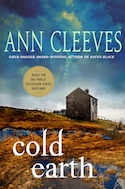
Ann Cleeves does not plot her tightly-knit mysteries ahead of time, so it’s good fun to imagine how she negotiated her way from the humdinger of an opening of Cold Earth (Minotaur): within the first few pages, a landslide brought on by relentless rains in Shetland rides roughshod over an ancient cemetery — during a funeral, no less — leaving a single fatality in its path. The remote island community and Shetland’s brooding Inspector Jimmy Perez are the perfect complement to a landscape both rugged and windswept. But even here, life comes at you fast, whether it’s murder, malice aforethought, petty politics, or budding romance.
There’s something terribly amiss in London in Ragdoll by Daniel Cole (Ecco). For one thing, detective William Fawkes, aka Wolf, is back on active duty after violently attacking a suspect in a courtroom four years earlier. For another, someone has just murdered six victims and sewn them together to make a single, gruesome corpse, one of whose fingers appears to be pointing directly into Fawkes’s nearby flat. The multiple plot lines have a manic erratic-ness to them, that sometimes adds, sometimes detracts from Cole’s careening debut.
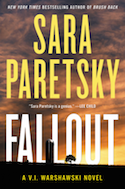
The disappearance of a young filmmaker following the ransacking of the gym where he held a day-job, kicks off the action in Fallout by Sara Paretsky (William Morrow). Luckily, for the filmmaker, he is a cousin of Chicago PI V.I. Warshawski, who is soon hot on the case. In a terrific, decades-spanning mystery that takes Victoria Iphigenia deep into the heart of a rural Kansas community, master-at-work Paretsky has multiple twisty aces up her sleeve, nicely enhanced with a rich cast of characters, a lovely shout-out to the super-speedy stock-car racer Danica Patrick, and multiple spirited reminders that here in these United States of America, the government is supposed to for We the People.
The Quintessential Interview: Lori Rader-Day
Lori Rader-Day sets her psychological thrillers in restricted, restrictive spaces — a tattered motel, an academic campus, a small town — which instantly projects their claustrophobic-tension levels into the stratosphere. The Day I Died, out this month from William Morrow, started life ten years ago as a short story; this extended version packs a powerful, sinister punch, with handwriting analyst Anna Winger trying to help the local police force locate a missing child and finding her own life spiraling rapidly out of control.
What or who are your top five writing inspirations?
Gossip: What people whisper about is what they care about. Weird news stories I find on Facebook: I save them, never knowing if they'll come into use. Other writers: I love hanging out with them and listening to them talk shop and process. Throwaway facts in nonfiction books that really need their own books. Deadlines.
Top five places to write?
A little desk in my guest room known as my "office." It's tiny. Starbucks: They have really good hot tea. Any cafe, actually: I like cafe noise – but not coffee. My backporch, in good weather and in rain. Airplanes, if I have enough elbow room: On the way to Left Coast Crime in Phoenix, I had my own row. Life highlight.
Top five favorite authors?
I'm going to go historical, to avoid making enemies: Agatha Christie. Shirley Jackson. Josephine Tey. Daphne du Maurier. Dashiell Hammett, but when I say this, I mean The Thin Man.
Top five tunes to write to?
Depends on what I'm writing. I make a playlist for every novel. These five songs helped me write The Day I Died:
- Blood in the Cut by K. Flay
- White Blank Page by Mumford & Sons
- Lucky Now by Ryan Adams
- Go Insane (Live) by Lindsey Buckingham
- Break Free by Matthew Santos
Top five hometown spots?
My real hometown is pretty small, so I'll tell you about Chicago, my adopted hometown: On Lake Michigan, out in water looking back on the city. The Book Cellar, one of Chicago's amazing independent bookstores. The Forest Preserve, in the woods, on a bike, with my husband. I need to do this more. Caro Mio, Italian restaurant with my girlfriends. Just add wine. Winter Garden, Harold Washington Library, which is a glass-ceilinged room with a view of the surrounding skyscrapers. It's just a very Chicago place.
I don't know how Clickhole roped him into this, but I'm really glad that they did.
A Master At Work: George Saunders Orders One Mousetrap Over The Phone pic.twitter.com/tL87kbTuOS
— ClickHole (@ClickHole) April 26, 2017
Today, at the ass-end of National Poetry Month, is Poem In Your Pocket Day, which poets.org urges you to celebrate by "selecting a poem, carrying it with you, and sharing it with others throughout the day at schools, bookstores, libraries, parks, and workplaces."
Don't have a poem in your pocket? You can always print one out. This poem is eminently pocket-sized. Also, this one. Open Books, which has been all over this National Poetry Month thing this year, is celebrating Poem in Your Pocket Day by giving away pocket poems all day to customers. They're also hosting a pocket-themed poetry reading with Seattle's Civic Poet, Claudia Castro Luna, at El Centro De La Raza at 1:30 pm today.
